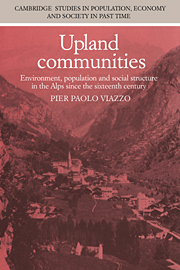 Upland Communities
Upland Communities Published online by Cambridge University Press: 13 October 2009
Industrial employment and geographical mobility in the ‘age of autarky’
Although the causes and nature of Alpine emigration have often been misunderstood, as the preceding chapter has tried to demonstrate, its significance has hardly been questioned by any scholar. It is indeed a commonplace among students of the Alpine world that seasonal emigration was the best way of optimizing labour during the slack winter months, while permanent emigration provided a crucial safety valve in a marginal environment where limited resources tended to be rapidly outstripped by demographic growth. In the cybernetic jargon favoured by ecological anthropologists, emigration was one of the ‘servomechanisms’ whereby a viable balance between population and resources could be achieved or restored. And in Malthus's model, too, emigration was granted a major role as one of the variables which could fundamentally affect the economic and demographic structure of upland communities and turn them into ‘open’ systems.
By contrast, the importance of immigration has been usually played down. It is of course acknowledged that the boundaries of Alpine communities were regularly crossed by a trickle of in-marrying spouses (mainly wives) from neighbouring villages. But, as far as proper migratory movements are concerned, the more or less tacit assumption is that, after the end of the medieval colonization of the high valleys, people from the lowlands had clearly little incentive to try and settle in the snow-bound and increasingly overpopulated uplands.
To save this book to your Kindle, first ensure [email protected] is added to your Approved Personal Document E-mail List under your Personal Document Settings on the Manage Your Content and Devices page of your Amazon account. Then enter the ‘name’ part of your Kindle email address below. Find out more about saving to your Kindle.
Note you can select to save to either the @free.kindle.com or @kindle.com variations. ‘@free.kindle.com’ emails are free but can only be saved to your device when it is connected to wi-fi. ‘@kindle.com’ emails can be delivered even when you are not connected to wi-fi, but note that service fees apply.
Find out more about the Kindle Personal Document Service.
To save content items to your account, please confirm that you agree to abide by our usage policies. If this is the first time you use this feature, you will be asked to authorise Cambridge Core to connect with your account. Find out more about saving content to Dropbox.
To save content items to your account, please confirm that you agree to abide by our usage policies. If this is the first time you use this feature, you will be asked to authorise Cambridge Core to connect with your account. Find out more about saving content to Google Drive.